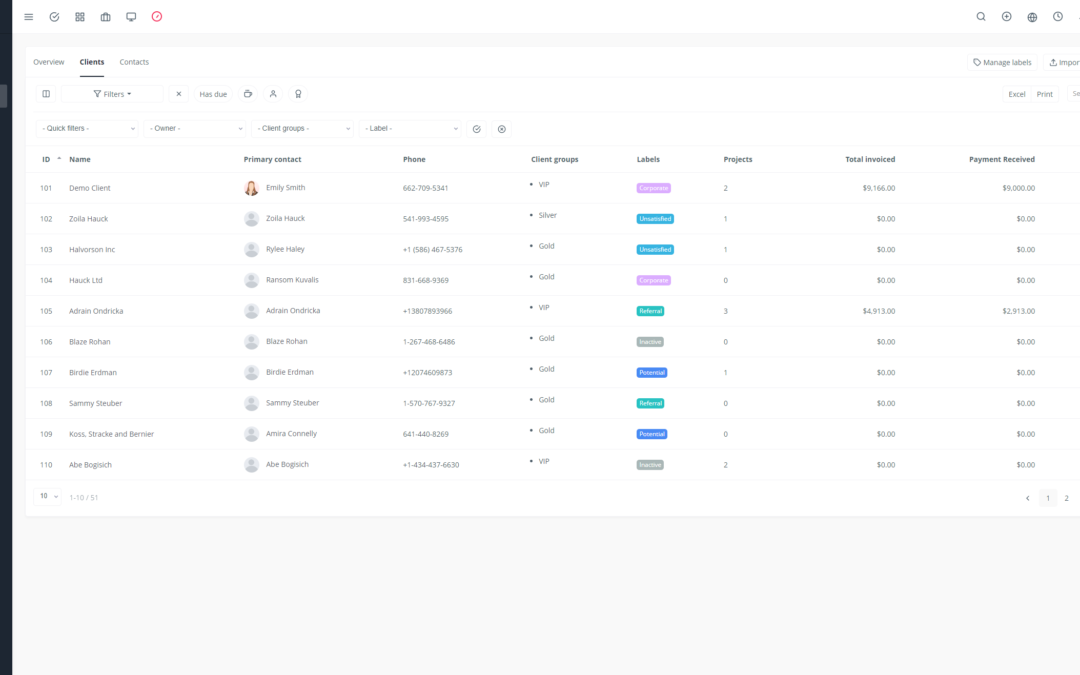The real estate market is constantly evolving. To succeed, real estate agents and businesses in the industry must adapt and make decisions based on solid information. That’s where CRM (Customer Relationship Management) and data analytics come in.
The Importance of CRM in Real Estate 🏠
A real estate CRM is an essential tool for managing your customer relationships and business operations. It allows you to centralize all information related to your leads, clients, properties, and transactions, giving you a comprehensive overview of your business.
Key Benefits of a Real Estate CRM 🔑
Improved Communication: A CRM facilitates communication with your clients by personalizing interactions and automating email and SMS messages.
Transaction Tracking: Track the progress of real estate transactions efficiently by centralizing important information and documents.
Lead Management: Qualify and segment your prospects and follow up regularly to maximize sales opportunities.
Performance Analytics: Evaluate the effectiveness of your marketing strategies and sales teams.
How Data Analytics Improves Decision Making 📊
Data analytics enables you to transform the raw information from your CRM into valuable insights. This allows you to understand market trends, identify sales opportunities, optimize your marketing campaigns, and improve customer satisfaction.
Types of Data Collected by Real Estate CRMs 🗃️
Demographic Data: Age, gender, profession, income, etc.
Property Data: Property type, size, location, price, etc.
Transaction Data: Dates, sale prices, transaction duration, etc.
Lead Data: Lead sources, interactions with your business, etc.
Client Data: Transaction history, preferences, needs, etc.
Analyzing Demographic Data and Market Trends 🏘️
By analyzing demographic data and market trends, you can identify high-potential areas, the most sought-after property types, and the most attractive prices.
Identifying Sales and Rental Opportunities 💰
Data analytics allows you to predict the future needs of your clients and identify sales and rental opportunities, ensuring you are always ahead of the competition.
Improving Lead and Customer Management 🤝
Data analytics helps you better understand the needs and preferences of your clients. You can then personalize your communications, offer tailored deals, and build customer loyalty.
Optimizing Marketing Campaigns and Communications 📣
Data analytics lets you target your marketing campaigns more effectively by segmenting your audiences and personalizing your messages. You can also identify the most successful marketing channels and optimize your spending.
Forecasting Performance and Market Trends 📈
Through data analytics, you can forecast your company’s performance and market trends. This enables you to anticipate changes and adapt your strategies accordingly.
Evaluating Agent and Team Performance 🏆
Data analytics lets you evaluate the performance of your agents and teams, identifying strengths and weaknesses. This helps you better train your teams and optimize their performance.
Enhancing the Customer Experience 🌟
Data analytics enables you to personalize the customer experience based on their needs and preferences. You can help them find the ideal property and guide them throughout their purchase or rental journey.
Personalizing Client Interactions 💌
A CRM lets you personalize your communications with each client. You can send personalized emails and SMS messages based on their history, preferences, and needs.
Effective Appointment and Follow-Up Management 📅
Schedule and manage your client appointments easily. The CRM allows you to track the progress of transactions and send reminders to keep communication active.
Automating Repetitive Tasks 🤖
Automate repetitive tasks like sending follow-up emails, generating reports, and data entry, which saves you time and allows you to focus on higher-value tasks.
Integration with Other Tools and Platforms 🧩
A powerful CRM integrates seamlessly with other tools and platforms, such as automated marketing tools, real estate search platforms, and document management tools.
Data Security and Privacy 🔒
Choose a CRM that guarantees the security and privacy of your data. Ensure that the CRM meets the highest security standards and implements measures to protect your data from unauthorized access.
Choosing the Right Real Estate CRM 🔍
Before choosing a real estate CRM, take the time to compare the different options available on the market. Consider your needs, budget, and the features offered by each CRM.
Integrating Data Analytics into the CRM 📊
Most real estate CRMs offer built-in data analytics features. You can also choose to use them in conjunction with third-party data analytics tools for deeper insights.
Best Practices for Data Analytics in Real Estate 💡
Clearly Define Your Goals. Before you start analyzing data, it’s important to define your goals and the questions you want to answer.
Collect the Right Data. Ensure you collect the data that will help you answer your questions.
Use Appropriate Analytics Tools. Choose data analytics tools that enable you to visualize and interpret data effectively.
Draw Conclusions and Take Action.* Once you’ve analyzed the data, remember to draw conclusions and act on the insights you gain.
Future Trends of CRM and Data Analytics in Real Estate 🔮
The future of CRM and data analytics in real estate is promising. CRMs are expected to become even more intelligent and personalized, using technologies like artificial intelligence and machine learning to enhance predictions, decision making, and customer relationship management.
By adopting a CRM and using insights gained from data analytics, you can make more informed decisions, optimize your operations, and take your real estate business to the next level. 💪

